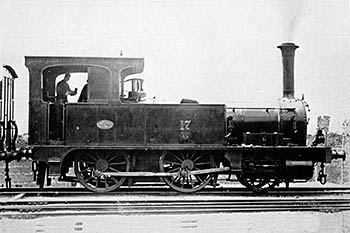Steam Locomotive
| 
No.2 Names during the 17 year period 1876-1909 (I.W.collection) |
|
Numbers 2, 3, 4 and 5 were manufactured at the
Sharp Stewart and Company,
their manufactured numbers were 2101, 2102, 2103 and 2104. They were regarded as the best of the imported engines and were most actively used.... Also Christy's report stated that "No.2-5 were the most dependable engines ......" During 1876, numbering rules were revised, so the Tokyo area was assigned to odd numbers, and the Osaka area was assigned to even numbers. According to this amendment, they were renumbered so that No.2 became No.17, No.3 became No.19, No.4 became No.15 and No.5 became No.13. There seemed to be no natural order in the numbering system used at that time, which became more apparent as time progressed. This was later clarified with confirmation of the original manufactured numbers. During 1883-1885, they all worked on Tohoku line construction in the Tokyo area. After 1886, they were used for yard works and short-range services. During 1906, there was a large scale amendment of Class names and Numbers. Their class names were changed to 160, and their numbers were changed to ; No.13 (ex-No.5) to No.160, No.15 (ex-No.4) to No.161, No.17 (ex-No.2) to No.162 and No.19 (ex-No.3) to No.163. And were later moved for Nagoya area's shunting operations ...... During April 1911, all of the class 160s were retired from the government-railway, and were sold to the Shimabara Railway Co. And numbers were again changed. No.160 to Shimabara's No.2, No.161 to Shimabara's No.3, No.162 to Shimabara's No.4, No.163 to Shimabara's No.5. Shimabara's No.3 (ex-No.4->15->161) was later sold to Unzen Railway Co. (Nagasaki prefecture ) during Mar 1927. But this Railway company was closed during Aug 1938. Accordingly, ex-No.4 was also retired and later scrapped. Shimabara's No.5 (ex-No.3->19->163) was sold to Tohi Railway Co. (Kumamoto prefecture) from Shimabara Railway Co. during Jul 1927. Tohi Railway altered its corporate name to Kyushu-Chikuhi Railway Co. during January 1929, but it was later closed during 1938. ex-No.3 was also retired and scrapped during that year. Of these remaining, two 160s were with Shimabara Railways. Shimabara's No.2 (ex-No.5->13->160) was later renamed to No.28 during 1948, and worked until Mar 1955. And it was later scrapped after retirement. The other Shimabara's No.4 (ex-No.2->17->162), was also renamed to No.3 (for the 2nd time) during 1943, and was renamed again to No.27 during 1948. Finally, ex-No.2 worked until Mar 1955, and was later scrapped. |
| Configuration | 2-4-0 | Dimensions Length (mm) | 3683
| Engine Weight (Operating tons) | 21.69
| Driver size (mm diameter) | 1346
| Boiler pressure (Kg/cm2) | 8.4
| |
|
No.2 |
No.3 | |||||||||||||||||||||||||||||||||||||||||||||||||||||||||||||

Shimabara Railway's No.4 time, Apr 1937. (Photo by J.Gohoichi) |

No.3 imported time. Biographic Data Chart No.2
Biographic Data Chart No.3
|
|
No.4 |
No.5 | |||||||||||||||||||||||||||||||||||||||||||||||||||||||||

Names during the 15 year period 1876-1909 (Photo credit to Railway Museum) |

Names during the 13 year period 1876-1909 (Photo credit to Railway Museum) Biographic Data Chart No.4
Biographic Data Chart No.5
|
Introduction
|
Go to Top
|